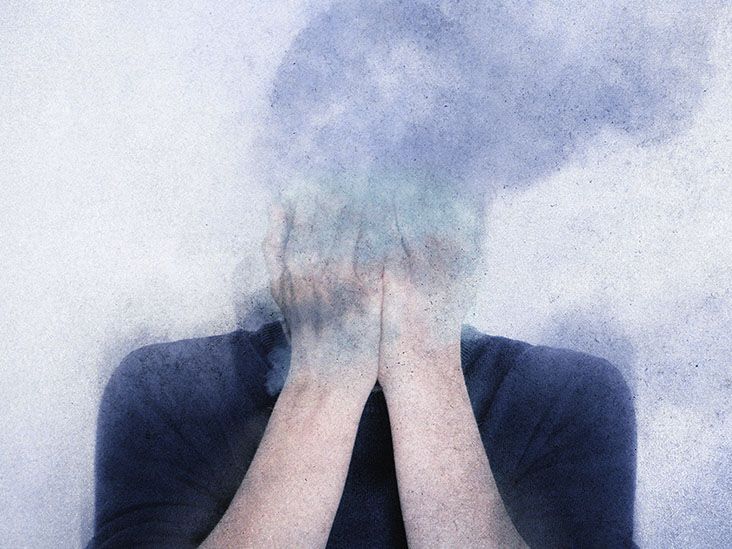Attention deficit hyperactivity disorder and schizophrenia are two different disorders that can profoundly affect a person’s life. While they have many differences, they also share some characteristics.
Attention deficit hyperactivity disorder (ADHD) is a chronic neurodevelopmental condition that involves behavioral symptoms, including inattentiveness, hyperactivity, and impulsiveness.
Doctors typically diagnose ADHD before the age of 12, and symptoms tend to improve with age. However, some people continue to have symptoms as adults.
In 2022, the
Schizophrenia is a long-term mental health condition that affects how a person thinks, feels, and behaves. It involves psychosis and other symptoms, including inattention.
The National Alliance on Mental Illness (NAMI) suggests that less than 1% of people in the United States have schizophrenia.
Read on to learn more about the possible links between the two conditions.

Various studies have identified some similarities between ADHD and schizophrenia and a possible overlap.
The conclusions of researchers include the following:
- People with schizophrenia often have symptomsof other psychiatric disorders, including ADHD, in early adolescence.
- Children and teenagers with ADHD may have a
4.59 timesTrusted Source increased risk of developing schizophrenia in adulthood compared to those without ADHD. - Close relatives of people with ADHD may be more likely than second-degree relatives to receive a diagnosis of schizophrenia, suggesting that it may have a genetic component.
The exact causes of ADHD and schizophrenia are not clear, but a combination of genetic and environmental factors may increase the risk of both.
A person with specific genetic features may develop symptoms if they encounter certain triggers, whether this exposure occurs before birth or during childhood and adolescence.
ADHD
Factors that may contribute to ADHD include:
- Genetic features: ADHD can run in families.
- Environmental factors: Exposure to toxic materials, including as a fetus, may increase the risk.
- Developmental issues: Problems with the central nervous system at important stages of development may result in ADHD.
Schizophrenia
Factors that may increase a person’s likelihood of developing schizophrenia include:
- Genetic features: Genetic factors appear to play a role. Having a close family member with schizophrenia may increase the risk.
- Brain development: Research shows that some individuals with schizophrenia have subtle differences in their brain structure.
- Neurotransmitters: An imbalance between dopamine and serotonin, the chemical messengers in the brain, may have a connection with schizophrenia. Drugs that alter the levels of these chemicals appear to relieve schizophrenia symptoms.
- Pregnancy and birth complications: A low birth weight, being born early, or not getting enough oxygen during birth are more likely to have affected people with schizophrenia.
ADHD and schizophrenia
Both conditions involve neurodevelopmental changes and can run in families. However, researchers have yet to determinewhether the same changes relate to both conditions or to what extent these underlying features overlap.
The risk factors for ADHD and schizophrenia are not the same, but they may overlap. For both conditions, some risk factors may affect a person before birth, while others come into effect during childhood and adolescence.
ADHD
Risk factors for ADHD may include:
- a family history of another mental health disorder
- parental stress and anxiety
- maternal alcohol and tobacco use during pregnancy
- maternal first-trimester antidepressant use
- exposure to certain substances while in the womb
a lack of specific nutrientsTrusted Source , such as zinc and iron- low birth weight
- a family history of ADHD
Schizophrenia
There is growing evidence that some environmental factors can lead to neurodevelopmental problems that result in schizophrenia.
Possible environmental factors include:
- exposure to certain substances, such as cannabis, before birth
- fetal malnutrition
- maternal infections during conception, pregnancy, or delivery
- late winter or spring birth
- advanced parental age
- low birth weight
ADHD and schizophrenia
Scientists believe that there is an overlap in the factors that can lead to ADHD and schizophrenia.
- Genetic factors: A person who has a close relative with schizophrenia may be more likely to develop ADHD. Researchers say that up to 80% of cases of schizophrenia and between
60% and 80%Trusted Source of cases of ADHD may result from inheritance. - Changes in underlying brain mechanisms: Some neurological factors are common to both conditions.
- Environmental influences: Exposure to specific influences before birth and during childhood appears to increase the risk of both conditions.
- Shared history: People who have schizophrenia are more likely to have had a diagnosis of ADHD during childhood.
Does ADHD medication lead to schizophrenia?
Some people who use stimulant medication to relieve the symptoms of ADHD go on to experience symptoms of psychosis.
However, it is unclear whether using stimulants to treat ADHD increases the risk of schizophrenia or schizophrenia-type symptoms, specifically psychosis. These symptoms may have appeared without the use of stimulant medication.
Exposure to psychostimulant drugs does appear to increase the risk of psychosis. Psychosis that occurs at a younger age is more likely to result from the use of psychostimulant drugs.
However, it remains unclear whether psychosis results from the use of the drugs or whether these individuals were already susceptible to psychosis.
In addition, the type of psychosis that people with ADHD experience tends to be different from that in people with schizophrenia, as it involves brief mental changes rather than full hallucinations.
The symptoms of ADHD and schizophrenia are different, but they overlap in the area of inattention.
ADHD
There are
- inattentive ADHD
- hyperactive and impulsive ADHD
- combined inattentive and hyperactive ADHD
| Symptoms of inattentiveness | Symptoms of hyperactivity and impulsiveness |
| •having a short attention span and getting easily distracted •making careless mistakes during activities •appearing not to listen •being unable to follow instructions and complete tasks •having problems with organizing tasks •being forgetful or frequently losing things •avoiding tasks that require mental effort | •fidgeting constantly and being unable to sit still •being unable to engage quietly in leisure activities •lacking concentration •talking excessively •interrupting other people’s conversations or intruding on •their activities •being restless •running excessively or climbing in inappropriate situations |
Not everyone who has ADHD will have hyperactivity as a symptom.
Schizophrenia
Doctors group the symptoms of schizophrenia into
| Positive symptoms | Negative symptoms | Cognitive symptoms |
| •hallucinations •delusions, such as believing that the government is pursuing them •paranoid thoughts •agitated or excessive body movements •agitated or inappropriate behavior | •social withdrawal •not caring about appearance and personal hygiene •reduced emotional expression •losing interest and motivation •trouble concentrating •changes in sleep habits •feeling unable to leave the house •a decrease in conversation and speaking | •having confused or disorganized thoughts •an inability to understand •information and make decisions •a lack of focus and attention •difficulty using learned information immediately |
ADHD and schizophrenia
ADHD and schizophrenia may share some symptoms.
For example, attention problems affect both people with ADHD and people with schizophrenia.
However, some researchers have suggested that the type of inattention involved in ADHD may be different from that in schizophrenia and that the underlying neurological features are also different.
Thought disorders and psychosis can also occur in both schizophrenia and ADHD. People with schizophrenia often experience psychotic episodes, which can involve hallucinations, delusions, and disturbed thoughts.
Psychosis is not typical of ADHD, but around 10% of people with this condition experience psychotic symptoms. One theory is that the stimulant drugs that doctors prescribe to treat ADHD may trigger these psychotic symptoms.
Research has shown that some people whose genetic makeup puts them at high risk of schizophrenia will meet the criteria for a diagnosis of ADHD.
Some people with ADHD also have hyperactivity, but this is not a symptom of schizophrenia.
Doctors use different criteria to diagnose ADHD and schizophrenia.
ADHD
There is
Diagnosis usually happens in childhood, often before the age of 12 years.
Schizophrenia
A doctor will ask the individual about their medical history and the symptoms that they are experiencing. They will also ensure that the symptoms are not due to medication, substance misuse, or another medical condition.
The doctor
If a doctor or mental health professional suspects schizophrenia, they will perform a psychiatric evaluation and compare the symptoms with diagnostic criteria for schizophrenia.
According to the NAMI, schizophrenia usually presents in males who are in their late teenage years or early 20s, while the onset tends to occur in females ages about 25 to 35 years.
ADHD and schizophrenia
A doctor will diagnose both ADHD and schizophrenia by comparing symptoms to those on a list in the latest edition of the Diagnostic and Statistical Manual of Mental Disorders (DSM-5).
The DSM-5 classifies schizophrenia and ADHD as completely different conditions. Schizophrenia is a psychotic disorder, while ADHD is a neurobehavioral disorder.
There is no cure for ADHD or schizophrenia, but treatment can help relieve symptoms.
ADHD
Treatment options
- stimulant drugs to boost and balance brain chemical levels
- nonstimulant medicines, which take longer to work than stimulants but can improve attention, focus, and impulsiveness
- behavioral therapy to help people manage and change their behavior
Schizophrenia
Treatment options for managing the symptoms of schizophrenia include medications and psychosocial therapy.
Treatment
- Antipsychotic drugs: These aim to manage symptoms by regulating levels of the brain chemical dopamine.
- Psychosocial therapy: This combines psychotherapy and social training to provide support, education, and guidance to people with schizophrenia.
- Hospitalization: This may be necessary when a person’s symptoms are severe.
- Electroconvulsive therapy (ECT): People whose symptoms do not respond to medication may benefit from ECT.
Similarities and differences
The treatment options for ADHD and schizophrenia are different. In both cases, doctors aim to manage symptoms rather than cure the condition.
For ADHD, a doctor may prescribe stimulants that increase dopamine levels in the brain. In some people, this type of drug may trigger psychosis.
For schizophrenia, a doctor will prescribe antipsychotic drugs that block the effect of dopamine.
How likely are some people to get an ADHD diagnosis when they actually have early symptoms of schizophrenia?
A person may meet the criteria for ADHD in their childhood and then receive a diagnosis of schizophrenia years later, but this does not mean that the first diagnosis was wrong.
It is more likely to indicate that the symptoms of schizophrenia were not present at the time of the ADHD diagnosis.
Is ADHD and schizophrenia more common in women?
ADHD appears to be more common in males than females.
However, this difference may be due to differences in how ADHD manifests, referral bias, and misdiagnosis or delays in diagnosis.
Meanwhile, schizophrenia generally affects males and females equally.
ADHD and schizophrenia are distinct mental health conditions, each with its own set of causes and symptoms.
However, research has shown that individuals with ADHD may be at a higher risk of developing schizophrenia later in life. They also appear to share certain risk factors, such as family history and prenatal influence.
Ultimately, the exact link between ADHD and schizophrenia needs further investigation.



